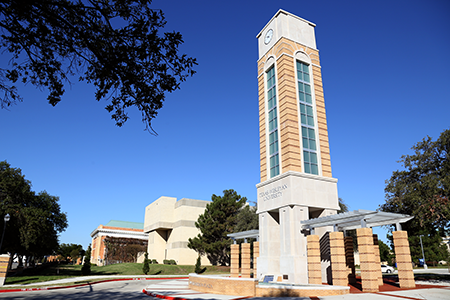From Campus to Care: Journey of Inspiration and Education

As Melissa “Reagan” Bryant '05 enters the pediatric ward, the cacophony of sounds washes over her. The beeping of monitors, the hushed voices of nurses and doctors, and the occasional burst of laughter from children filled the air. Despite the sterile surroundings, the children’s laughter and curiosity fills her with a sense of warmth and resilience. As a teacher for inpatient children, she is here to provide a temporary escape from the hospital environment, to spark their imagination, and to help them find joy and wonder in their illness.
A 100-count box of pencils in a back-to-school bag rests on the desk, with a message added to each: "You matter", "I am glad that you are here", "You can do it", and other things she hoped would make a student smile. The pencil along with the message was for those students to keep. Reagan didn’t know working in the hospital unit was an option as a teacher, but it was something she could do to help others. The Hospital/Homebound program is a program through FWISD that provides educational services for students experiencing health-related issues that will require them to be out of school. Certified teachers go to the home or hospital to meet with the students to provide academic instruction to stay caught up with their classmates.
Reagan learned of the position through previous students who had been through the program. “The hardest part of the job is seeing students struggle,” said Reagan. However, “seeing them realize that they can be successful despite their struggles is the most rewarding part of the job and the rewards outweigh the difficulties.”
Reagan never dreamed of being a teacher, but Texas Wesleyan opened unexpected doors for her. Prior to her time in education, Reagan was a probation officer working on cases that were mainly 17 to 21-year-olds.
“They had never had anyone telling them anything positive and they didn’t believe in themselves,” she said. She wanted students to know they were worthy before ever getting to that point. She began substitute teaching and realized she enjoyed working with the kids in the classroom and ended up teaching at a traditional high school for nine years in various subjects.
“Remembering how hard high school was, even before social media, helps me encourage my kids when things get rough, and to remind them that there are people around them who care and are willing to support them,” Bryant said.
Going to college was hard on Bryant. She bounced from different universities and junior colleges, but none were the right fit for her. Bryant took time off from school due to an injury, got married and had her son, which inspired her to return to college and help others meet their goals and dream big. Following in the footsteps of her parents, she then transferred to Texas Wesleyan University.
“My own learning experiences have impacted the way I relate to my students. I was diagnosed with ADD as an adult and spent many years thinking that I wasn't trying hard enough, even when I felt like I was doing all that I could.” Finding out that she could learn better in a different way and being patient with those methods has helped her be more sensitive to her students' needs. She took time to reflect and understands high school can be difficult. She thought everyone she looked up to in high school had it all together, only to find out that they were struggling with social and academic insecurities or finding out they thought she had it together. “It makes me realize that none of us had it figured out - and we weren't supposed to. We were kids”!
“Texas Wesleyan was always a huge part of my life; and my parents always told me it was a family, but I don’t think I understood until I got here for my first class 40 years after my dad started,” said Bryant. “I went from a kid who struggled with junior college thinking college just is not for me to being almost done with a Ph.D. I know that was rooted in the lessons I learned at Texas Wesleyan.”
Bryant went into teaching, hoping to give back to her community as her parents and Texas Wesleyan had empowered her to do. This legacy of commitment and compassion has profoundly influenced Reagan's approach to teaching and her broader mission to make a positive impact in society. By integrating the lessons learned from her family and her education, Reagan Bryant continues to help others, embodying the essence of a true Ram who enriches lives through unwavering support and dedication to making a difference.
“Smaller. Smarter. embodies Wesleyan. You are not just a number here; you are a part of the RAMily.” She makes connections with co-workers who share this tie with her. “It’s a community of people who look out for each other and who support each other, and it is smarter to have that!
Students should go here because they will find support and connections.” Bryant feels joy when her students attend college here. She tries to support them by providing connections, encouraging them and attending their signings for athletics, joining the theatre program, etc. “You are going to get top notch education here.”
As the daughter of Wesleyan alumni, Reagan's connection to the university is more than just academic—it is a familial bond that shaped her worldview. Her parents' involvement in campus life and their enduring support exemplifies the spirit of community and service that Wesleyan fosters. This legacy has profoundly influenced Reagan's approach to teaching and her broader mission to make a positive impact in society. By integrating the lessons learned from her family and her education, Reagan Bryant continues to help others, embodying the essence of a true Ram who enriches lives through unwavering support and dedication to making a difference.
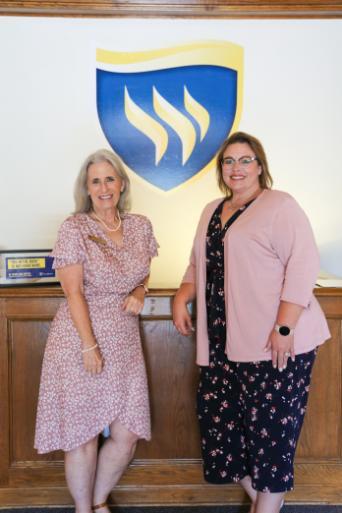
Reagan with Martha Earngey, who went to grade school with Tom Crow, and college with both of Reagan’s parents. They are standing in front of the desk Reagan worked at as a student worker.
Reagan received her Bachelor of Arts in Psychology. Her father, Tom Crow ‘’77 started at Texas Wesleyan as a first-year student after high school and her mother, Katie, transferred to Texas Wesleyan to be with him. These high school sweethearts couldn’t stay apart. Tom was a member of Alpha Phi Omega (APO), and Katie joined Gamma Sigma Sigma. They were married after their freshman year, and a year and a half later they were expecting Reagan. The first person they told this exciting news to was their English professor, Mrs. Bay. “Reagan was in Dr. Ballard’s class, whom her parents had the first semester they were married. Dr. Ballard even told Reagan that her parents were very competitive about their grades!
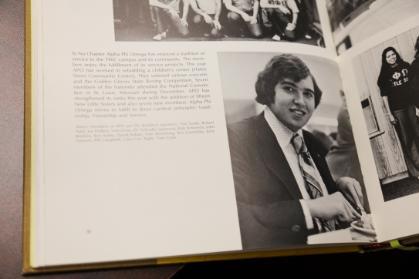
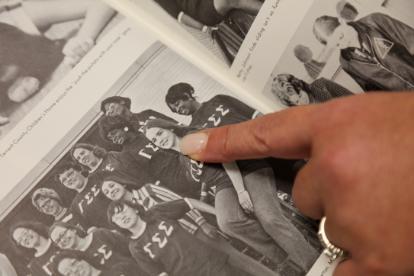
Reagan’s parents: Tom Crow (APO) and Katie Crow (Gamma Sigma Sigma)
Reagan’s godparents and her youngest sister's godparents were both APO/Gamma Sig couples. To this day, her parents and godparents still have “Wesleyan dinners” together, with close to 20 people whose only original connection is that they met on a small campus in East Fort Worth in the 1970’s. Several of them have kids and grandkids who also attended Texas Wesleyan.
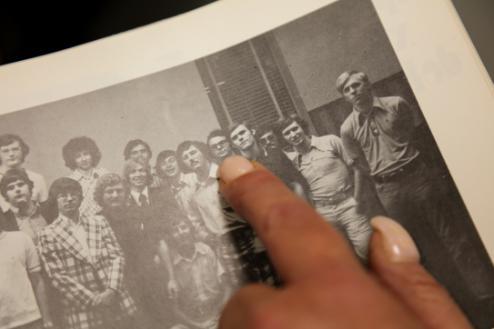
Reagan’s Godfather (APO Member)
Reagan transferred to TXWES and was a legacy at Gamma Sigma Sigma Sorority and served as Alumni Rep and VP of Publicity. Reagan loved being a member of her sorority and the Greek Council. “We were all friends regardless of which organization we were in,” she says. She was a member of the Wesleyan Student Foundation, Mortar Board, President of Psi Chi, a panel speaker at the Goostree Symposium her senior year and a recipient of the Guardian of the Golden Shears. “Texas Wesleyan encouraged service to others. Everywhere you turned, somebody was trying to help other people.” She said, “Wesleyan encouraged giving back.”
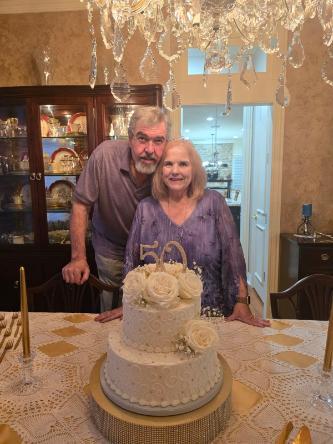
Reagan’s parents: Tom Crow (APO) and Katie Crow (Gamma Sigma Sigma)
“Since graduating from Wesleyan, I have added to my Ramily through friends I have made in grad school, co-workers, and students who are now loving Wesleyan as much as I have. During the ten years that I was in a traditional classroom, I have encouraged many students to check out Wesleyan to see if it is a good fit for them, and I have taken great pleasure in writing recommendation letters for students who have chosen to pursue that avenue.”
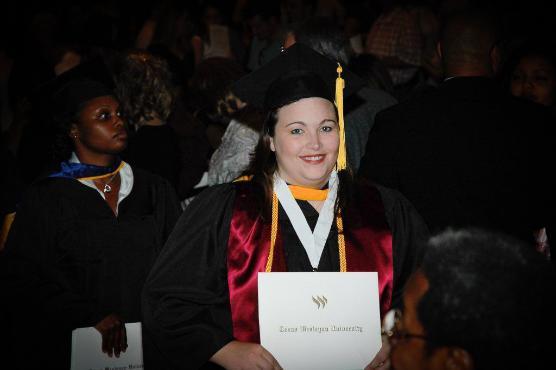
Reagan’s graduation from TXWES.
Reagan Bryant's journey from a struggling student to a dedicated educator exemplifies the profound impact of support and resilience. Her transition from a probation officer to a teacher, fueled by a deep-seated desire to uplift others, highlights the transformative power of empathy and encouragement. Through her work at John Peter Smith Hospital, Bryant not only provides a temporary respite for her young students but also embodies the values she learned at Wesleyan University—values of community, support and service. Those values are the reason she teaches today, to teach those who need support the most. Her story demonstrates the importance of nurturing environments in education and the significant role of personal connections in fostering success. Reagan Bryant's legacy will be a testament to the lasting influence of a supportive education and the enduring commitment to making a difference in the lives of others.








